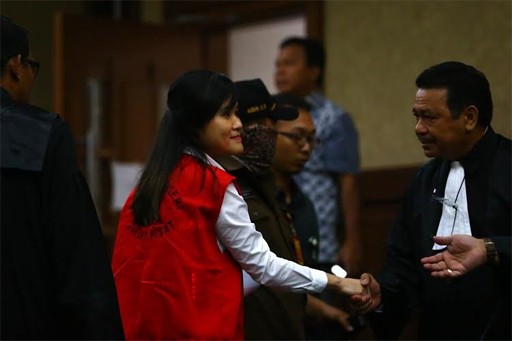Popular Reads
Top Results
Can't find what you're looking for?
View all search resultsPopular Reads
Top Results
Can't find what you're looking for?
View all search resultsThe social responsibility of lawyers
Change text size
Gift Premium Articles
to Anyone
W
hen I was a student at the University of Indonesia’s (UI) School of Law, I worked as assistant to the president of the Jakarta Legal Aid Institute (LBH Jakarta) and I must admit that I learned a great deal from the work.
At the LBH, legal aid was provided for poor, underrepresented and marginalized people. Those who cannot afford lawyers and meet all administrative requirements can come to the LBH Jakarta for free legal assistance where a group of young lawyers is ready to represent them.
Legal aid at that time was not called pro bono, but essentially the LBH Jakarta practiced pro bono
publico, which according to the Dictionary of Legal Terms refers to work for the public good and welfare.
When an attorney takes on a case without compensation to advance a social cause, or to fill a perceived social need to offer legal representation to the poor, the attorney represents the party pro bono publico.
The LBH Jakarta later broadened the definition of pro bono publico to also cover cases that it considered “constitutionally important”.
That explains why the LBH Jakarta, for instance, has defended student activists, political prisoners and members of the media who themselves may not necessarily be poor but their cases are considered constitutionally important. In other words, their cases could influence democracy, the rule of law and human rights.
Indonesia does not have a long history of pro bono practice. There has not been much research or many publications about legal practices under colonial times except by a few Dutch scholars and recently by Daniel S. Lev, a noted Indonesianist from Cornell University, the US. Having said that, it would not be an understatement to say that the tradition of pro bono practice is not rooted in our legal profession.
This does not mean that earlier advocates in Indonesia had no idea about pro bono practices. First generation practicing lawyers were involved in the fight against colonialism. Individually, the advocates did take up cases on behalf of poor, underrepresented and marginalized people. It was sporadic and unorganized, however.
The Indonesian Bar Association (IKADIN) was formed in 1964 and slowly but surely developed into a grouping of many lawyers practicing law and providing legal services to society, including the poor and those who had no access to justice.
It was in 1971 that the LBH Jakarta came into being, when the Indonesian Bar Association together with the Jakarta administration agreed to lay the groundwork for legal aid services to the poor and the needy — those who could not afford lawyers.
At that time, young, idealistic and energetic lawyers were recruited to pioneer work as public defenders.
They worked full time and received monthly remuneration, albeit far below that of lawyers working in law firms and commercial companies. But they were enthusiastic and proud of their accomplishments. Interestingly, they became role models for young lawyers, and their names appeared in various newspapers and magazines.
They became the inspiration for law students who aspired to be public defenders, and along this line law schools established legal aid offices as part of their service to society.
Pro bono efforts, if they are to grow, require solid and strong support and commitment from bar associations as well as the government. I have observed that our bar associations have paid relatively little attention to the development of pro bono services.
The legal profession, in my opinion, stands behind the rich and the powerful, becoming a money machine and forgetting its social responsibility. It is no surprise then if many cynically describe the legal profession as “defending those who pay, not those who are right”.
Having said all of that, it is not my intention to suggest that no pro bono services are emerging and developing. There are small groups of advocates who allocate some of their time to do pro bono work.
However, as all pro bono work originates from law firms and solo practitioners, we should not expect any impressive developments from pro bono advocates.
This is the time for Indonesian advocates to take the side of justice seekers, not to be selfish or chase after money, enriching themselves while ignoring their social responsibility to people at large.
In addition, it is the inherent duty of advocates to help strengthen the foundation of the rule of law, human rights and democracy, which would contribute a great deal to more avenues by which to seek justice, and to make all people realize that justice belongs to everyone, not only to a privileged few.
We all can learn from countries where the tradition of pro bono has been well established, through which bar associations require law firms and lawyers to allocate a portion of their time to pro bono work. There is a tendency for the average hours spent on pro bono work to gradually increase, which gives advocates and law firms both intellectual and emotional satisfaction in the sense that they feel worthy and useful to society.
How could you not feel satisfied if migrant workers or victims of human trafficking that you defended won a case against a greedy “mafia”? Indonesia, the Philippines, India and Bangladesh, for instance, all face migrant worker and human trafficking problems.
Instead of working individually and nationally we could do it together with a network through which we could coordinate and share the collective action that must be taken. Through such a network, perhaps, extra-legal work could reasonably be discussed before being pursued.
Bringing bar associations into the picture would certainly be appropriate in the sense that it would give more weight to pro bono work. Combining legal advocacy and extra-legal work, in my experience, has been quite effective and satisfactory.
There are many pressing problems faced by minority groups, women, lesbian, gay, bisexual and transgender (LGBT) individuals and children. Undoubtedly those people need our commitment to
assist them.
There have always been radical and fundamentalist elements within society that impose their own rules and restrictions, not to mention intimidation and terror.
Those affected by discrimination and violence prefer not to open up their cases to the public. They do not want to face further retaliation and terror. In my humble opinion, it is our duty as members of the legal profession to provide pro bono legal assistance to those in need.
Again, in this respect, bar associations must do their utmost to support pro bono advocates in performing their social-legal responsibility to the community.
This is the time for the legal profession in Asia, including Indonesia, to realize that it is indebted to countries and their people. A debt has to be repaid and it is long overdue.
Pro bono legal services are one of the answers. Every bar association should require its members to allocate part of their time to pro bono legal services of their choice, either individually or jointly.
__________________________________
The writer chairs the Indonesian Bar Association (IKADIN) and is a member of the International Bar Association (IBA). This article is an abridged version of his paper presented at the 2016 Asia Pro Bono Forum on Aug. 29 to 30 in Bali.










